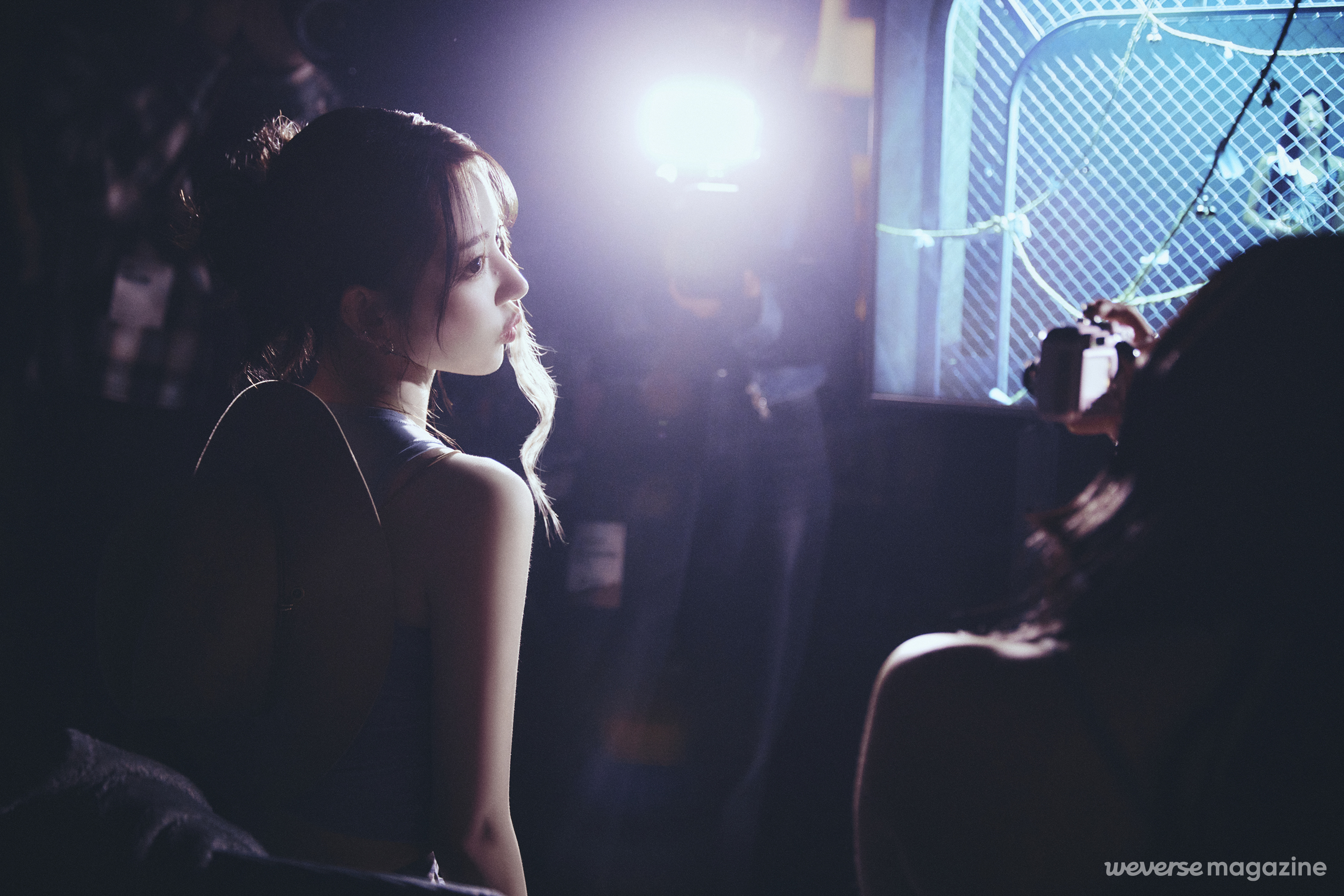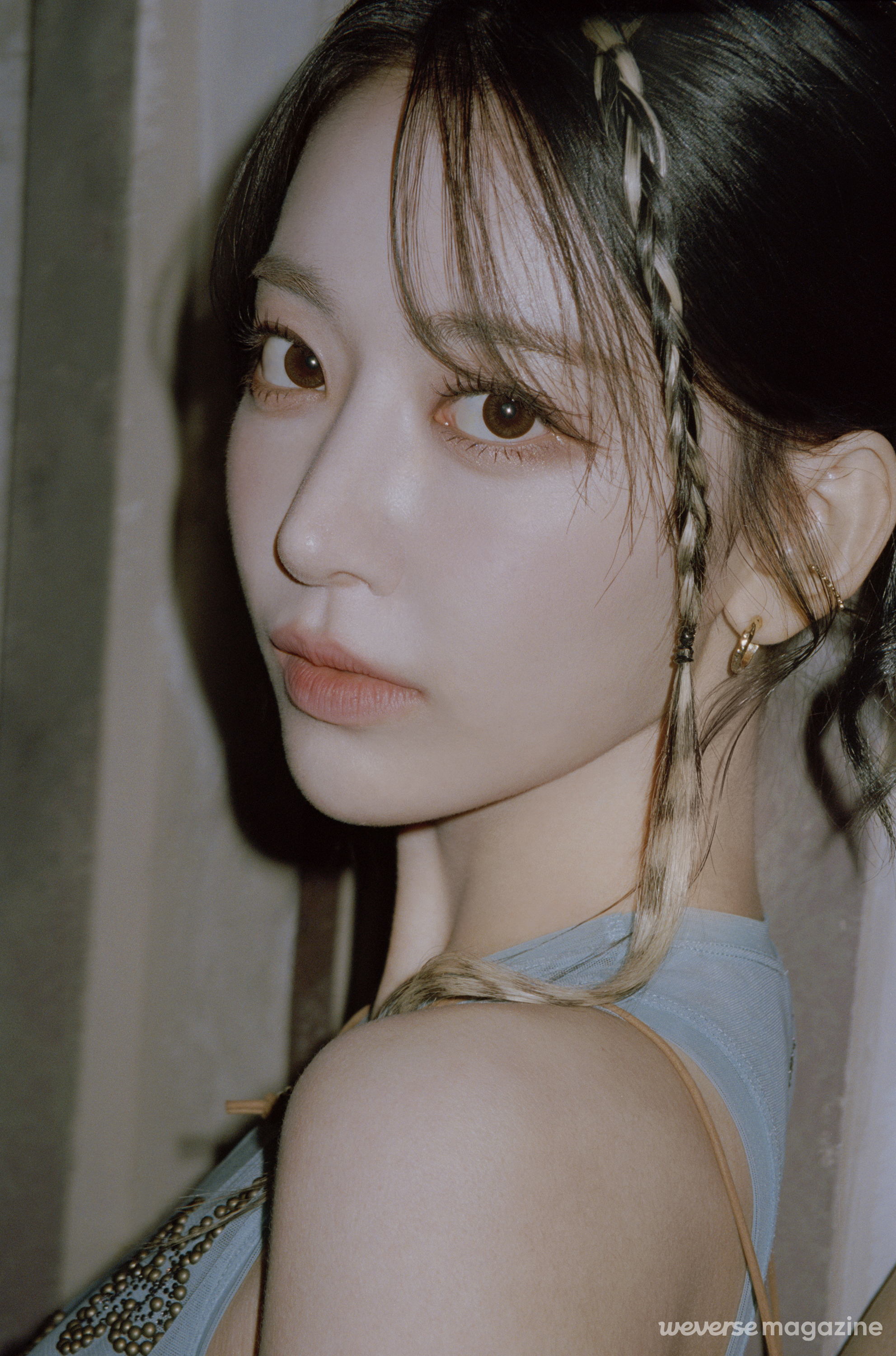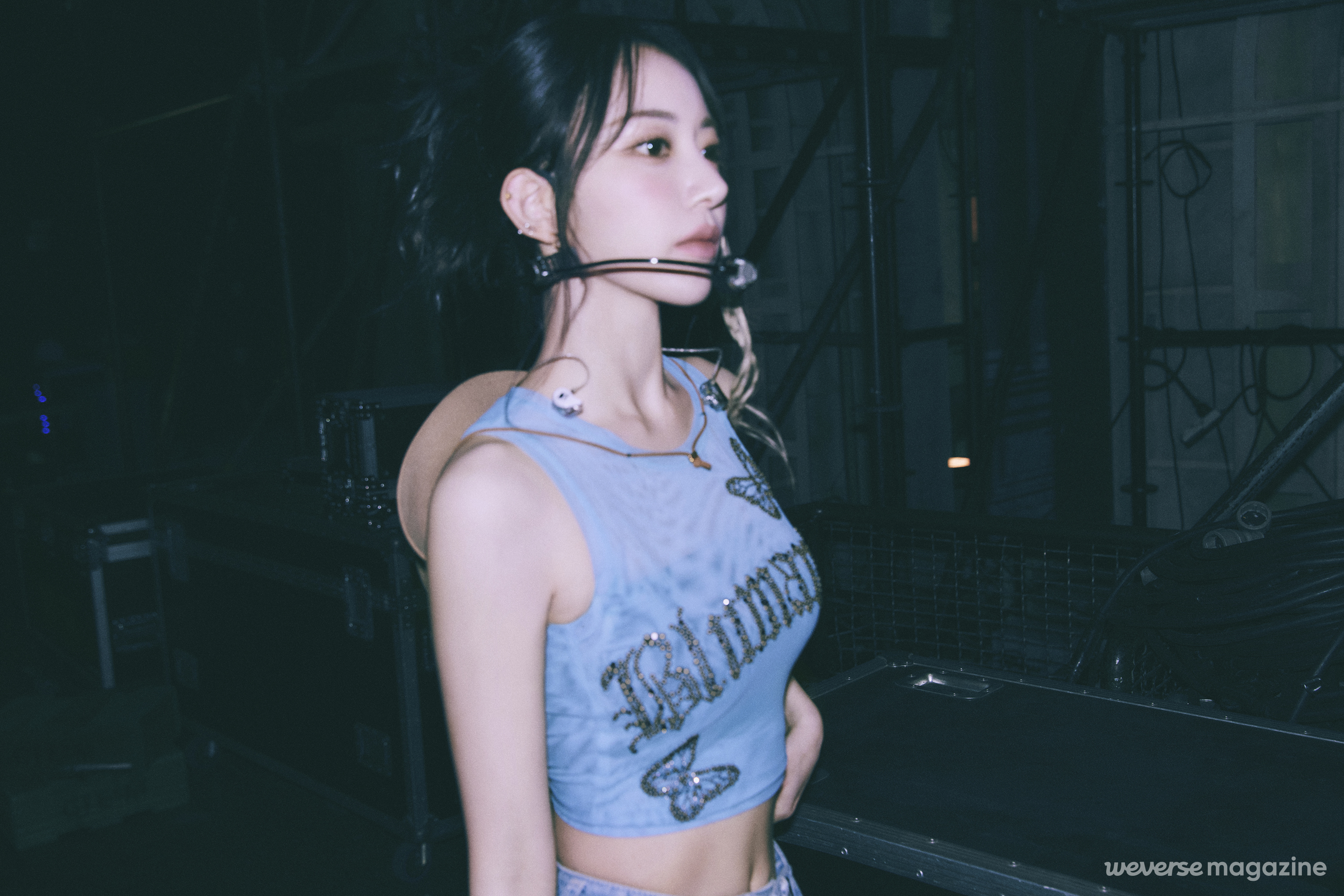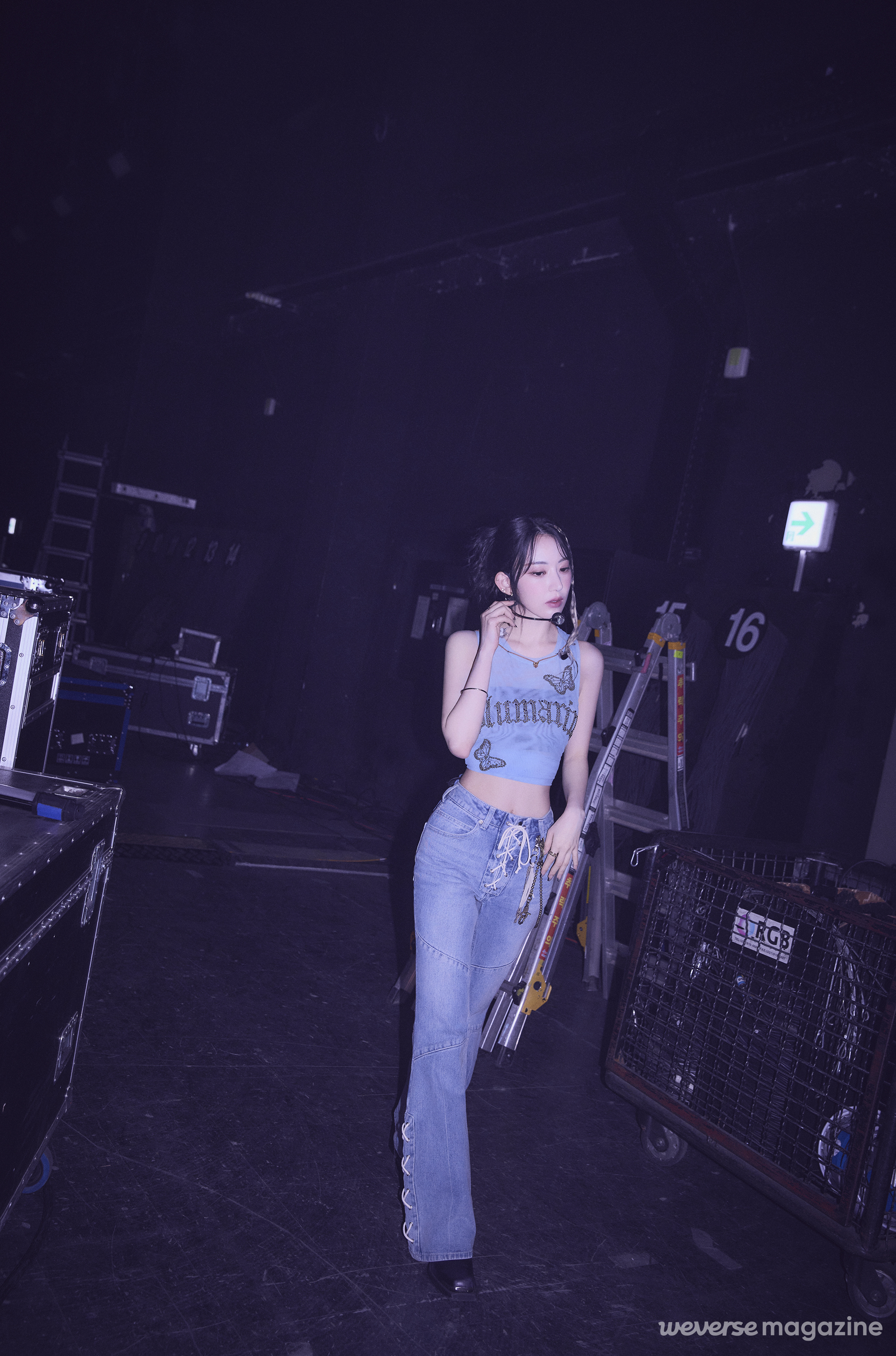
Youth. A season that blooms beautifully, blue bruises and all. For SAKURA, that season is forever.
You give a stronger vocal performance throughout the whole album. Your vocals have opened up more and become more expressive than before. Did you take a different approach this time?
SAKURA: I tried to sing with more confidence because there were a lot of songs I had to sound cool on, including the lead single. Songs like “Fire in the belly” are full of passion and you have to practically scream them or tighten your vocal cords, and it’s important not to be even slightly nervous when singing those.
How do you deal with nerves?
SAKURA: You sort of have to brainwash yourself. (laughs) Like, I can do it! I got this! Saying that on repeat. (laughs)
You have to constantly contend with nerves since you’re in the public eye at all times. With that in mind, what was it like sending messages like “I’m a villain” in “UNFORGIVEN” (feat. Nile Rodgers) and “I’m a mess” in “Eve, Psyche & The Bluebeard’s wife” with LE SSERAFIM?
SAKURA: I think what makes LE SSERAFIM so special on stage is how energetically we show desire and other emotions that are supposed to be kept private. Those are the kind of performances I always wanted to be a part of. It’s nice to be angelic, pretty and cute too, but there’s more to a person than such positive emotions. And I feel like I’ve started to get more comfortable since I started Fearless Kkura. I’m very direct on that show. (laughs) I thought I wasn’t supposed to say certain things on camera, like, I’m tired; I wanna go home; it’s freezing; I don’t want to do this and that. But actually, people said it makes me seem more human, and that made me realize how much the world has changed.
The main message of the new album is, “We don’t have to be forgiven.” I think it’s a meaningful message, coming from someone who’s been in the industry for a long time.
SAKURA: Everybody’s had an experience of being judged and misunderstood based on just one aspect of themselves, right? I’ve always lived as me, being me, but there've been people who were like “She’s not as bad as I thought” after misunderstanding me based on just one aspect of me. Some compliment me on one little thing I do and then criticize me for something else a moment later. It suddenly occurred to me: Why are they forgiving me, when I’m not living my life to the fullest to be forgiven in the first place? So when I heard what “UNFORGIVEN” was all about, it felt just like our story. I’ve got FEARNOT supporting me, the other members holding my hand and our staff that gives me strength. I want to be with people who see and accept us for who we are.
In Fearless Kkura, there’s an episode where Park Sung Woong has to try living like an idol and you gave him some advice: “(An idol) must smile like this.” Having spent as much time in the industry as you have, do you find it challenging that idols can’t always show their real selves?
SAKURA: Actually, I think the stage is the only place idols can express all their emotions. I also get a lot of comfort from telling my fans how I’m really feeling but I don’t think we should stop smiling and talk about how hard we have it or let our personal feelings get in the way when we’re on camera. There’s times when you have to keep smiling no matter what—that goes for idols and for people in other jobs too. I do think it’s important to smile in my line of work and that the time to show my real colors and express my emotions is when I’m on stage.
You make a distinction between the attitude required for the job and all the messages you get across on stage. You’re a real pro!
SAKURA: Correct. (laughs)
I feel like that’s the essence of LE SSERAFIM: to keep things upbeat even when the going gets tough. Where do you find the strength to do that?
SAKURA: We all have the same flame inside us. CHAEWON and I had already debuted before, YUNJIN went through a lot before her debut, Zuha had to deal with preparing to debut while still doing ballet and EUNCHAE had a hard time too. I’m sure everybody goes through something like that, but for us, there was nothing easy about getting to where we are now, and going through such hard times makes us want to climb that much higher. It’s really rare for people to share the same flame the way we do. Even if a group of people all share the same vision, their passion and attitude could all be different minute to minute. So we completely lucked out that the five of us came together to become LE SSERAFIM. (laughs)
That makes me think of what you say in “Burn the Bridge”: “You would be there by my side, the one with the same flame as me.” I love how expressive you are with it.
SAKURA: I’m really interested in narrating. I like it so much that I even used to think about doing it seriously. I got the recording for “Burn the Bridge” down in two or three takes. The producers said, “We don’t speak Japanese but that was absolutely moving.” (laughs) That made me feel good. For “The World Is My Oyster” and “The Hydra,” all the emphasis was on first-person pronouns: na, I, watashi-wa. It was like talking to yourself. I felt like it was about trying to be strong even when you feel scared and uncertain inside. But then in “Burn the Bridge” the subject becomes “we” and there’s more hopeful words as it describes all the members working together. It makes me feel stronger and better supported. When we were shooting the “Burn the Bridge” trailer, there’s the part where I first appear and I’m all cut and bruised, and for that part, I imagined it was when I was doing this all alone—before I met the other members. It’s like I had already been hurt so many times that I stopped feeling anything anymore and nothing hurt and I had already given up on myself, but that I should still smile because I’m an idol.
But there’s happiness in your smile after you meet the others, right?
SAKURA: Right. The shots where we ran hand in hand were like a movie. Of all the videos I’ve been in, that trailer was my favorite. (laughs)
You’ve often said “there’s nothing scarier than people” but it seems like you still have a soft spot for others. You’ve got a strong bond with the other members, and even though you’re an introvert, you manage to get into deep conversations with people like Deft on Fearless Kkura.
SAKURA: The reason I love people is because I want to be loved too, to be honest. It’s my job to be considerate toward others and I think I have to be loving in order to be loved myself. The way you treat people is how they end up treating you, after all. And the people I talk to on the show all made their mark in fields different from mine so I wouldn’t really get a chance to talk to them otherwise. That’s why I’m curious how they think and what they’ve done and it makes me feel admiration for them as we talk.
Although you said you were “born to challenge” yourself, it seems like your admiration for your group is even stronger than your personal ambition. In the behind-the-scenes clips from the 2022 Melon Music Awards, you give the others confidence by doing things like complimenting KAZUHA on her performance and telling HONG EUNCHAE that “luck is a kind of skill in itself” given that she felt pressure from debuting so quickly.
SAKURA: I think their job is also my job. When one of them succeeds somewhere, I feel as happy and as proud as if I were the one who had done it. And you get lonely trying to make such a big dream come true all by yourself. Even if you accomplish 100% of your goal, it’s still just 100%. With us, there’s five of us, so we work together to reach our goal and we can be 500% successful instead. That’s why I always wanted to be part of a group that can stick together for a long time.
What do you hope to accomplish with the group?
SAKURA: Idols are idealized role models, of course, but I want LE SSERAFIM and our fans to grow and simply live together. We’re not perfect yet but we’re getting better and we talk about issues and tough stuff and tell each other it’ll all be okay. I want us to always be by FEARNOT’s side, just like if we were living together.
You sang “Yume de Kiss me!” with the group, a song you previously sang when you were an idol in Japan, to mark your birthday at your fan meeting, FEARNADA. How does it feel looking back and seeing how far you’ve come?
SAKURA: I think youth can be defined as the time you strive to achieve your dreams and move forward. So for me, every moment is youth and it will never end. Singing “Yume de Kiss me!” was part of my youth, and so is FEARNOT as they watch us, and my current life with LE SSERAFIM is, too. Even if I stop being an idol, my youth will stretch on. But you don’t get much time in life to follow your passions with such intensity. I can work hard at any time but I think the longer I live the more fear and pain I’ll experience and they might be at different levels, so I want to hold onto all my memories. Even the painful ones.
It’s like the song “Flash Forward”—how all the scenes in a movie are already written, and even though the ending’s set in stone, you just keep moving forward.
SAKURA: A little while ago I posted on Weverse my memo thinking I don’t want to forget about the painful parts of the past. Looking back now, I went through a lot of rough times, but I can’t remember them that well—not so much overcoming them as just forgetting about them. Then I thought that might make my past self lonely so I decided I still want to hang onto the memory of the hard times.
In the movie About Time, it’s possible to go back to any point in time and make different decisions, which also affect the future. If you could travel back in time, when would you travel back to?
SAKURA: If I changed even one decision I made in the past, the person I am today would cease to exist. So I don’t think I really need to go back.




Unauthorized reproduction and distribution prohibited.



